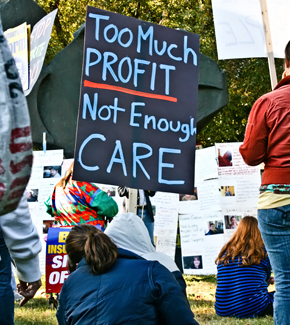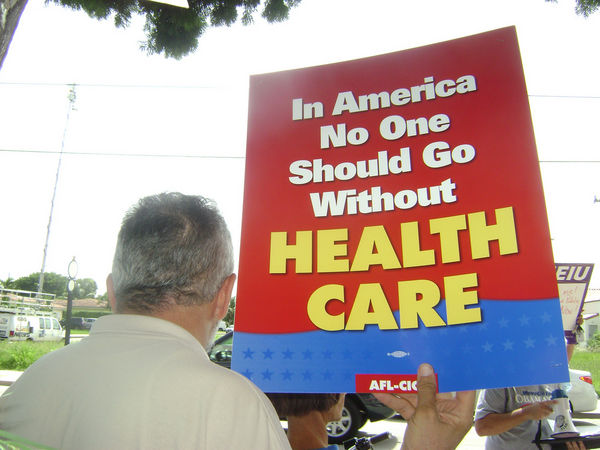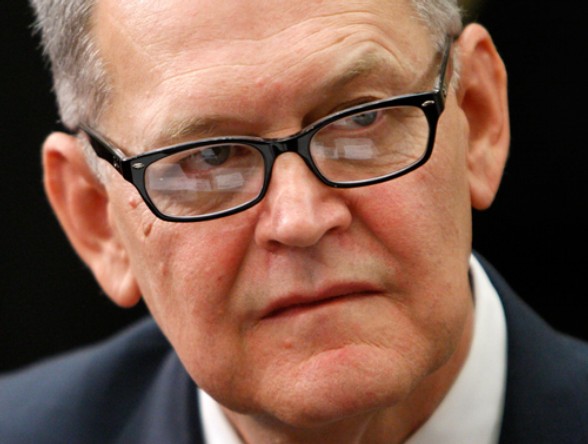Submitted by Wendell Potter on
Three of the biggest health insurers have announced quarterly earnings in the past few days. If Americans were able to eavesdrop on what executives from those firms tell their Wall Street masters every three months, they would have a better understanding of why premiums keep going up while the number of people with medical coverage keeps going down.
 It only takes three words, when you get right down to it, to describe the real of those folks: profits over people.
It only takes three words, when you get right down to it, to describe the real of those folks: profits over people.
CIGNA and Humana are scheduled to report earnings this week. The three companies that have already spoken -- UnitedHealth, WellPoint and Aetna -- earned a combined $2.51 billion from April through the end of June, more than analysts expected. On a per share basis, their earnings were up more than 17 percent on average compared with the second quarter of 2010.
Those results were no anomaly. The big for-profit health insurers have been blowing analysts' expectations out of the water for several quarters in a row, even as the country struggles to recover from the recession and the number of Americans without coverage -- one out of every six of us -- continues to rise.
Based on their strong performance during the first half of this year, UnitedHealth, WellPoint and Aetna have all have raised their profit forecast for 2011. In other words, they expect to earn far more this year than last year and far more than even the most hopeful investors and analysts had anticipated.
This has made Wall Street very happy indeed, as reflected in the breathtaking increase in the companies' share prices over the past year. Since the end of July 2010, investors have bid up the stock by more than 50 percent at four of the big five. WellPoint, the laggard, saw its stock price increase by a still-impressive 35 percent.
One of the secrets to achieving these results is what the insurers euphemistically call "medical management." That often translates into denied claims and denied coverage for doctor-ordered care. The fewer claims you pay and the more procedures you refuse to pay for, the more money is left over for investors to put in their pockets.
 Another important way they've been able to sustain such a string of impressive earnings results is to shift more and more of the cost of care to their policyholders. An increasing percentage of these companies' policyholders are enrolled in plans that require greater cost sharing. Those policyholders pay more for care out of their own pockets than ever before while their insurers are paying much less.
Another important way they've been able to sustain such a string of impressive earnings results is to shift more and more of the cost of care to their policyholders. An increasing percentage of these companies' policyholders are enrolled in plans that require greater cost sharing. Those policyholders pay more for care out of their own pockets than ever before while their insurers are paying much less.
The insurers are loathe to admit this, and have been making up a host of incredible excuses to explain why they are paying so much less for care than investors and analysts had expected and so much less on a percentage basis than in previous years.
Unending Excuses to Duck the Truth
At the end of 2010, executives told Wall Street that the "utilization" of medical services was lower than in 2009 because the flu season last year was less severe. They assured investors utilization would return to more normal levels during the first quarter of 2011.
When it didn't, the bad winter weather was to blame. Insurance executives wanted us to believe that people were not getting the care they needed because it was colder and snowier than usual. They assured us that medical spending would jump again as soon as the weather improved and the ice and snow melted.
Surprise! It's August and people are still not going to the doctor or picking up their prescriptions or checking into the hospital as much as they usually do.
And what's the excuse this time? It's the economy, they say -- even though the recession officially ended more than a year ago. At least UnitedHealth's executives acknowledged that, as AP reported, "health plans that make patients more aware of the cost of care may be having an impact."
May be? Give me a break. And stop the double-speak. What we're so aware of is that we're simply unable to get the care we need because of the often sky-high deductibles of today's health plans, which insurers mislabel "consumer-driven."
Insurers' Code Words
Insurance industry executives are experts at talking in code, which makes it difficult to understand just how much they value profits over people. Occasionally, though, they slip up, as Aetna's chief financial officer, Joseph Zubretsky, did last Wednesday during his company's conference call with analysts.
Clearly concerned that investors might think Aetna was willing to grow by adding people to its rolls who might have substantial medical needs, Zubretsky disabused Wall Street of that notion.
 "We would like to have both profit and growth, but if you have to choose between one or the other, you take margin and profit and you sacrifice the growth line," Zubretsky said.
"We would like to have both profit and growth, but if you have to choose between one or the other, you take margin and profit and you sacrifice the growth line," Zubretsky said.
Whether he knew it or not, he was channeling WellPoint CEO Angela Braley. In a 2008 conference call with financial analysts, Braley had to acknowledge that her company had spent more on medical care during the previous three months than she and Wall Street had expected.
In the future, she promised, "We will not sacrifice profitability for membership."
That was exactly what Wall Street wanted to hear.
WellPoint and Aetna and other insurers have demonstrated repeatedly that while they will do all they can to avoid sacrificing profitability for membership, they are quite willing to sacrifice their members -- and the American public -- for profits.
